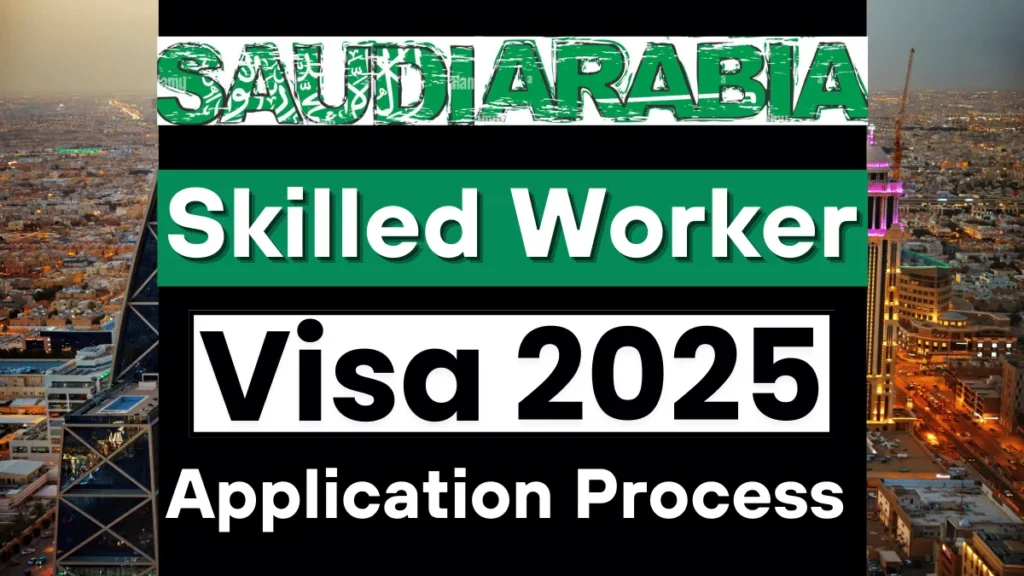
Saudi Arabia updated its work-permit system in 2025 with a skill-based classification designed to match foreign hires to the Kingdom’s evolving labour market
Whether you’re an employer recruiting overseas talent or a skilled professional seeking a move, this practical guide explains the visa route step-by-step, what’s changed in 2025, required documents, timelines, typical costs, and tips to avoid delays.
Quick Overview
Work visas for Saudi Arabia continue to be employer-sponsored: a Saudi-registered company must initiate the process and apply on the worker’s behalf.
The new 2025 system classifies work permits by skill level (high-skill, skilled, basic) and evaluates candidates by education, experience, professional skills, wage level and age. This classification affects permit type, fees and eligibility.
Who this pathway is for
- Skilled professionals (engineers, IT specialists, healthcare staff, technical experts) and experienced tradespeople who have a confirmed job offer from a Saudi employer.
- Candidates who meet the employer’s recruitment criteria and can provide verified qualifications, police clearance and a clean medical report.
Also Check: Turkey Golden Visa Process Via Investment 2025: Step by Step Guide
What Changed in 2025
Saudi authorities introduced a formal skill-based permit classification in mid-2025. The system was rolled out in phases and integrates with the Kingdom’s digital HR platforms; employers must now assign a skill category to each expatriate role and provide supporting evidence when applying for permits. Employers and applicants should expect stricter documentation checks and automated classification rules tied to the national skills taxonomy.
Main Visa Types & Workplace Residency
Work Authorization / Employment Visa (entry visa): Issued after the employer obtains a work permit authorization (often called a visa authorization slip). The worker receives an entry visa to travel to Saudi Arabia for employment.
Iqama (Residency Permit): After arrival, the employer completes medical checks and registration; then the worker is issued an Iqama (residence permit) which allows long-term legal residence and sponsorship privileges.
Step-by-Step Application Process
1. Employer posts role and completes recruitment checks
The employer advertises or documents recruitment efforts and confirms the candidate meets the job criteria (education, experience, licences). For non-Saudi hires, employers must demonstrate that the vacancy could not be filled locally where applicable.
2. Employer requests a work permit / block visa allocation
Using official HR platforms, the employer requests a work permit slot for the foreign hire. The new classification (skill level) is recorded as part of the request and will determine the permit category. Employers must be compliant with wage-payment systems and labour rules to qualify as sponsors.
3. Government review & visa authorization
Authorities review the submission, verify documents and confirm the classification. When approved, a visa authorization slip (power of attorney / wakala) is issued so the foreign national can apply for the consular visa or travel authorization.
4. Consular visa stamping (if required)
The candidate submits required documents at the Saudi mission in their home country (or follow the electronic visa instructions) to obtain the employment entry visa. Typical paperwork includes the authorization slip, passport, verified degree(s), police certificate and medical clearance if required.
5. Arrival, medical screening & biometrics
On arrival the worker undergoes mandatory medical screening (blood tests, chest X-ray and other checks) and submits fingerprints/biometrics as part of the Iqama process. Employers usually arrange and pay for these steps.
6. Iqama issuance and registration
Once medicals and paperwork are cleared, the employer registers the employee with the Ministry systems and the residence permit (Iqama) is issued. The Iqama must be carried at all times and is needed to sponsor family members once salary and other criteria are met.
Required Documents
- Valid passport (minimum validity usually 6+ months) with blank pages.
- Signed employment contract detailing role, salary and duration.
- Degree certificates, professional licences and verified credentials (attestation/apostille as required).
- Police clearance certificate (no-criminal record) from country of residence.
- Medical test reports (pre-departure or on arrival as required by employer/mission).
- Passport photos and any additional sponsor forms the employer submits.
Employers may also be asked to provide evidence of company compliance with wage payment and labour regulations before a permit is granted.
Fees & Estimated Processing Times
Governments and service providers report that visa application fees and administrative charges vary by category; some employers pay a standard processing charge (examples in market reports show an application fee of around SAR 1,000 for certain temporary work services, but final employer costs depend on permit class and service provider fees).
Typical timeline: Employer submission to visa authorization can take several days to a few weeks depending on completeness of documents and classification checks. Consular visa stamping and arrival-to-Iqama completion usually take 2–8 weeks in total under normal circumstances. Expect longer times if documents need extra verification.
FAQs
Q: Can I apply directly as a worker?
No. Employers registered in the Kingdom must sponsor and submit permit applications on behalf of foreign workers.
Q: Does the new system allow easier mobility between employers?
The new skill classification aims to modernize permits; mobility rules depend on the permit type and contractual obligations—workers should consult HR and authorities about transfer rules.
Q: Will existing expats be affected?
Existing expatriate work permits are being reviewed under the new classification; many current employees must have their status aligned, sometimes via administrative updates controlled by employers.
